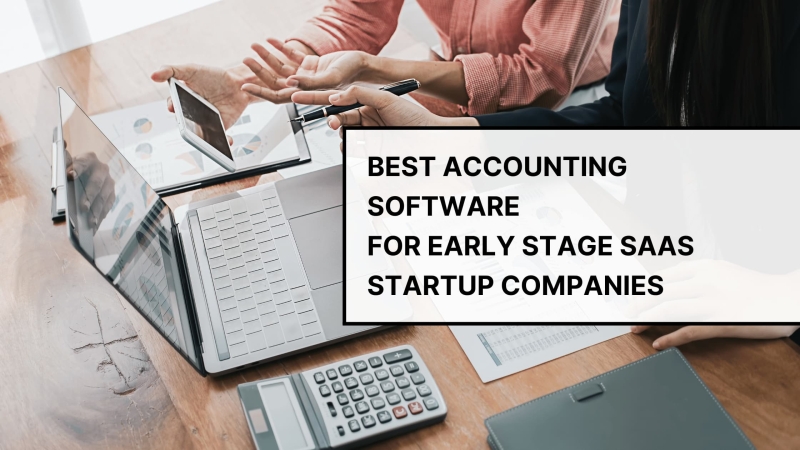
Managing finances is one of the most critical (but challenging) tasks for any early-stage SaaS business. With priorities like subscription billing, revenue recognition, and lean finance operations, businesses need the right SaaS accounting software solutions to support their growth without tacking on needless complexity.
This guide is for finance and accounting teams, founders, or CFOs evaluating startup accounting software. Below, you’ll find 12 tools, practical advice on choosing the right platform, and clear summaries of pricing, pros, cons, and ideal use cases—so you can streamline subscription billing, bookkeeping software, financial reporting, and overall financial management.
How to Choose the Right Accounting Software
Selecting the right accounting tool goes beyond pricing or brand names. You want to make sure the software supports your SaaS accounting processes and scales with your startup’s evolution.
Key factors to consider:
- Subscription & Revenue Recognition: Get support for 606 compliance and integrations with billing platforms like Stripe or Chargebee.
- Automation & Integrations: Eliminate manual data entry by automating account data flow and syncing with CRM, payroll, and payment tools.
- Financial Reporting & Statements: Receive real-time insights through dashboards with customizable reporting features, including income statements and cash flow.
- Ease of Use: Minimize onboarding for finance and accounting teams with clean, user-friendly interfaces.
- Scalability: Get support for multiple users, multi-entity operations, and advanced functionality.
- Inventory Management: Streamline your operations by tracking inventory—particularly important if your business model includes physical components.

1. QuickBooks Online
- Simple Start is $38/month (billed monthly). It includes invoicing, income and expense tracking, and basic financial statements.
- Essentials is $75/month. Supports up to 3 users and adds time tracking and bill management.
- Plus is $115/month. Supports up to 5 users and includes inventory management and project profitability reporting.
- Advanced is $275/month. Supports 25 users with custom financial reporting and dedicated account services.
QuickBooks Online supports core accounting processes like transaction reconciliation, reporting, and invoice automation, making it a popular choice for SaaS accounting software. Its robust ecosystem integrates cleanly with tools like Stripe, Chargebee, and Gusto, delivering accounting data flow and support for subscription revenue tracking.
Whether you're running lean or growing fast, QuickBooks offers efficiency and familiarity. Real-time dashboards and automation reduce manual bookkeeping, making it easier for finance teams to focus on strategy rather than repetitive data entry.
- Integrations with SaaS billing and payment tools.
- Intuitive interface reduces training time.
- Flexible with multiple users and growing finance teams.
- Fully featured inventory tracking for Plus users.
- Higher tiers comes with advanced reporting.
- As you add users or modules, pricing increases fast.
- No built-in revenue recognition automation.
- Some advanced features feel clunky, requiring add‑ons.
User Reviews
Users highlight QuickBooks for its dependability and integration features. Critiques often mention unexpected add-on costs and syncing problems with bank feeds.
SaaS startups that need scalable, widely supported accounting software with extensive integration options.
2. Xero
- Early is $20/month. You're limited to 20 invoices and 5 bills.
- Growing is $47/month. No volume limits.
- Established is $80/month, adding expense tracking, inventory, and multi-currency support.
Xero delivers cloud-based accounting for finance and accounting teams that need real-time reconciliation, automation, and clean financial reporting. Because all plans come with unlimited users, it's great for collaboration and streamlines bookkeeping software tasks across teams. Plus, Hubdoc (a bill and receipt capture tool) is included on all three plans at no extra cost.
Subscription revenue data flows easily thanks to Stripe and Square integrations. And Xero’s smart workflows—for, say, handling recurring invoices and bank rules—help you accurately conduct revenue tracking with little hands-on effort.
- Unlimited users on all plans.
- Strong bank feed reconciliation and automation.
- Integrates with SaaS payment tools.
- Higher tiers come with multi-currency and inventory support.
- Clean, intuitive interface with mobile access.
- Early tier offers limited invoicing and bills.
- Some add‑on modules can raise costs.
- Customer support is sometimes slow to resolve issues.
User Reviews
Users praise Xero for its ease of use and bank feed functionality. Not surprisingly, the restrictions on lower-tier features and occasional support delays draw criticism.
Bootstrapped SaaS startups needing scalable, multi-user accounting with automation and clean reporting.
3. FreshBooks
- Lite is $21/month (monthly billing). It includes invoicing, expense tracking, and time tracking.
- Plus is $38/month, with added options for recurring billing, proposals, and payment reminders.
- Premium is $65/month. This plan supports up to 500 clients, plus advanced reporting.
- Select uses custom pricing for high-volume businesses.
Note: A 10% discount is available when you opt for yearly billing.
FreshBooks is ideal for startups combining resale services with product offerings. It handles subscription management for service-based revenue, tracking time, billing, and accounting processes in one clean interface.
While it lacks strong SaaS-specific features like revenue recognition, its client focus and mobile-first UX make it practical for lean teams that want lightweight, but capable bookkeeping tools.
- All-in-one platform for service billing and client management.
- Built-in time tracking and project invoicing.
- Excellent mobile app and clean UI.
- Dedicated support with quick response times.
- Monthly recurring billing and reminders.
- Lacks native revenue recognition features.
- Not optimized for pure, product-based SaaS billing.
- Financial reports are limited in depth.
User Reviews
Users commend FreshBooks for its simplicity and responsiveness, but some say they quickly outgrow it as their business grows in complexity.
Service-heavy SaaS startups needing fast, simple billing without full subscription logic.
4. Zoho Books
- Standard is $20/month. It supports basic reporting and recurring invoicing.
- Professional is $50/month, with added inventory and purchase orders.
- Premium is $70/month. It includes workflow automation and a custom domain.
- Elite is $150/month. Comes with inventory tracking across warehouses and multiple locations.
- Ultimate is $275/month with advanced analytics.
Note: Discounts are available when you opt for annual billing.
Zoho Books delivers SaaS accounting software solutions with built-in automation for recurring revenue and workflow rules to reduce manual data entry. Because it's part of the broader Zoho ecosystem, it connects naturally with Zoho CRM, Projects, and Inventory, so your accounting data flows between all your apps without a hitch, and you get financial insights across teams and departments.
It’s especially valuable for businesses handling inventory, client, and sales workflows. Automation on mid-tier plans offloads routine work, letting finance teams focus on analysis instead of data entry.
- Generous free tier for early revenue.
- Built-in inventory tracking on paid plans.
- Tight integration across the Zoho suite.
- Rich automation for recurring tasks.
- Scalable user access (up to 15 users).
- User interface can feel complex.
- Integrations outside the Zoho ecosystem are limited.
- Reporting tools are less sophisticated than enterprise options.
User Reviews
Users appreciate its value and efficiency. Some mention that support responses can be slow, and onboarding is challenging for complex workflows.
SaaS startups using Zoho tools that want affordable, integrated accounting and workflows.
5. Wave Accounting
- Starter is free, and you get unlimited estimates and basic bookkeeping.
- Pro is $19/month. Adds automation and the option to accept online payments.
Note: Discounts are available when you opt for annual billing.
Wave provides honest startup accounting software. And it comes at no cost for core bookkeeping needs, like invoicing, expense tracking, and basic financial statements, making it great for teams testing ideas or operating with minimal funding.
Beyond the basics, it doesn't handle automated subscription billing or advanced revenue processes. It also offers limited integrations and lacks SaaS-specific automation or analytics.
- Completely free for core accounting tasks.
- Simple, intuitive interface.
- Unlimited clients and invoices.
- Basic bookkeeping without recurring fees.
- No revenue recognition or subscription support.
- Minimal integrations and reporting options.
- Not scalable beyond basic finance tracking.
User Reviews
Users love that Wave is truly free. Critics point out that features quickly fall short as business complexity increases.
Solo founders or very early-stage SaaS startups that just need to keep their books straight for no or minimal cost.
6. Sage Intacct
- Custom pricing. (Often starts around $400/month, plus modules.)
- Modules include core accounting, revenue recognition, multi-entity consolidation, and advanced reporting.
Sage Intacct is a scalable platform built for financial management and GAAP-compliant revenue recognition. It’s well-suited for SaaS companies that manage multiple subsidiaries or international billing operations, offering precise financial reporting, inventory management, and multi-entity consolidation.
Although the setup process can be long, the rewards justify the time investment: enterprise-grade automation and customizable dashboards tailored for finance and accounting teams.
- Advanced revenue recognition and multi-entity support.
- Deep automation and analytics.
- Audit-ready GAAP compliance tools.
- Scalable with business growth.
- High control over financial reporting.
- Complex implementation and pricing.
- Not cost-effective for early-stage startups.
- Requires trained finance staff to operate.
User Reviews
Users praise the tool's reporting and consolidation abilities, but businesses with more basic needs tend to be turned off by the high cost and long setup times.
Growth-stage SaaS companies that require enterprise-grade financial infrastructure and compliance.
7. Bench
- Bookkeeping starts at $399/month.
- Bookkeeping & Tax starts at $699/month. Includes tax filing.
Note: Discounts are available when you opt for annual billing.
Bench combines bookkeeping software with dedicated accountants who—every month—prepare financial statements and then handle routine accounting processes. The platform frees up founders to focus on growing instead of ledger work.
Its service model and dashboard support clean financial reporting without internal finance staff. While it lacks SaaS-specific features, it’s perfect for early teams prioritizing simplicity and accurate monthly reporting.
- Professional-grade bookkeeping services.
- Clean, accessible monthly reports.
- Transparent pricing for core services.
- No accounting burden for founders.
- Optional fractional CFO and catch‑up services.
- Lacks built-in subscription billing or revenue recognition.
- Cost could be prohibitive for pre‑revenue teams.
- Limited flexibility for custom workflows.
User Reviews
Users praise its clarity and hands-off support. Some say they quickly outgrow Bench when more complex accounting needs crop up.
Founders who want professional bookkeeping without assembling an in-house finance team.
8. Chargebee
- Starter is free for the first $250K in cumulative billing, then 0.75% on additional volume.
- Performance is $599/month. Supports up to $100K in billing per month.
- Enterprise uses custom pricing.
Chargebee is tailored for SaaS billing automation and subscription management, handling plans, usage-based billing, and automated revenue recognition. It integrates with tools like QuickBooks and Xero to feed clean accounting data for financial reporting and forecasting, key for accurate SaaS metrics like ARR and churn.
You'll still need a separate tool for bookkeeping, but it does support critical SaaS accounting software solutions by automating recurring billing logic and dunning workflows.
- Handles complex subscription and usage billing.
- Built-in ASC 606 compliance and revenue recognition.
- Advanced dunning logic and churn tracking.
- Excellent integration with leading accounting tools.
- Scalable up to enterprise billing volumes.
- Not a standalone accounting tool.
- Implementation can be technical and time‑consuming.
- Prices can jump fast as volume increases.
User Reviews
Users highlight its flexibility for SaaS billing and compliance. Beginners, who sometimes find setup overwhelming, tend to need technical support.
SaaS businesses with recurring billing and usage-based models that need accurate financial automation.
9. Pilot
- Bookkeeping starts at around $199/month.
- CFO Services starts at $2,000/month (billed quarterly).
- R&D Tax Credit is offered at 20% of your total credit received.
Pilot blends bookkeeping software with high-touch accounting and CFO support. It delivers investor-quality financial statements, accrual accounting, and recurring reconciliation for SaaS subscription revenue—ideal for teams building for scale.
The platform integrates with tools like Stripe and QuickBooks to deliver clean accounting data, digital dashboards, and custom financial modeling tailored for finance and accounting teams.
- High accuracy and SaaS-relevant expertise.
- Hands-off bookkeeping with CFO guidance.
- Integrated financial modeling and forecasting.
- Investor-grade reporting and clean data.
- Supports complex SaaS workflows.
- Might not be feasible for those with tighter budgets.
- Less control for DIY founders.
- Requires onboarding time and process alignment.
User Reviews
Users love the strategic insight and reliability. Some mention the expense as a barrier for early teams.
Funded SaaS startups without in-house staff that still need professional-grade finance and strategic accounting.
10. Ramp
- Free comes with a corporate card with up to 1.5% cashback and basic expense management.
- Plus is $15/month per user. Adds advanced automation and policy controls.
- Enterprise uses custom pricing.
Ramp is a spend management platform that automates transaction capture, receipts, and approvals—feeding clean accounting data into systems like Xero or QuickBooks. Its automation reduces manual entry and improves visibility into employee costs and travel expenses.
For SaaS startups, Ramp aligns well with subscription workflows, policy enforcement, and financial governance—without adding extra accounting burden.
- Zero cost for robust spend automation.
- Up to 1.5% cashback incentive.
- Seamless integration with major accounting tools.
- Real-time spend analytics.
- Reduces manual data entry burden.
- Not a replacement for general accounting software.
- Small teams might find the expense policies rigid.
- Requires integration to be fully effective.
User Reviews
Users highlight Ramp’s automation and cost control. Some feel approval workflows aren't flexible enough for small startups.
SaaS startups managing distributed spend that want clean ledger integration without manual effort.
11. Stripe Atlas
- Stripe Atlas is a one-time fee of $500. Includes incorporation, business setup, and access to Stripe.
Stripe Atlas helps SaaS founders establish operations quickly, open bank accounts, and set up financial management through the Stripe ecosystem. Combined with revenue recognition and analytics tools, it supports early-stage SaaS accounting processes and subscription data flow.
It doesn't do everything a complete accounting system would, but it provides modular tracking and clean accounting data with developer-friendly APIs and onboarding resources. And you can access other Stripe products like revenue recognition, analytics, and tax tools, each with their own pricing structures.
- Fast, global incorporation setup for SaaS.
- Developer-friendly APIs for financial data.
- Direct billing integration with Stripe.
- Scalable micro-services for financial insights.
- Requires technical setup or developer support.
- Handles essential financial tracking, but doesn't replace comprehensive accounting software.
User Reviews
Founders appreciate the quick setup and flexibility, though some mention having to piece together additional tools to complete their financial workflows.
API-focused SaaS startups that need fast setup, billing infrastructure, and modular analytics without building out a complex internal system.
12. ZipBooks
- Starter is free and includes invoicing and basic reports.
- Smarter is $15/month. Adds recurring invoices and time tracking.
- Sophisticated is $35/month. Adds bank reconciliation and advanced financial reporting.
- Accountant uses custom pricing, for firms.
ZipBooks offers accessible bookkeeping software for early-stage SaaS founders. It covers core accounting processes like invoicing, expense tracking, time capture, and reporting—and the interface is clean and minimal, reducing onboarding friction.
While it lacks subscription revenue recognition or advanced automation features, its simplicity and entry-level workflow tools make it effective for founders focused on getting organized before they scale.
- Clean interface with a short learning curve.
- Easy-to-set-up automation, even for beginners.
- Affordable plans that cover core functions.
- Strong time and expense tracking.
- Lacks SaaS-specific automation and reporting.
- Minimal outside integrations.
- Not designed for complex financial workflows.
User Reviews
Users like its intuitive design and affordability. But as businesses grow, scalability limitations emerge.
Early SaaS teams focused on lightweight bookkeeping without complexity or high cost.

Pro Tip: Most of these platforms offer free trials or starter plans. If you're stuck between a few, experiment with ones that seem like a fit for your organization before making a commitment.


